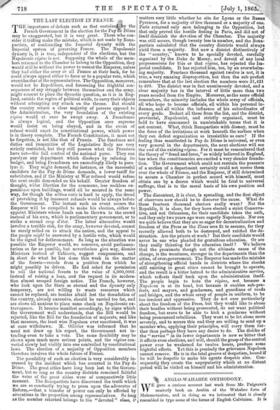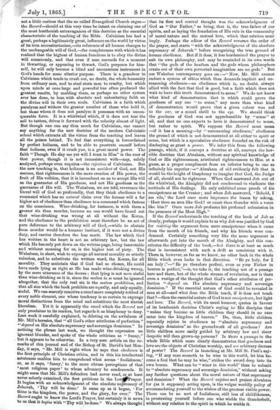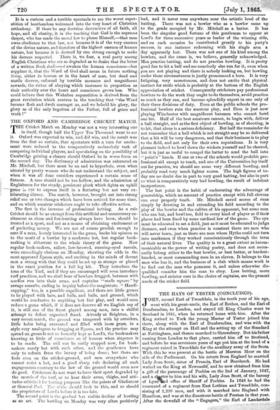A.NGLO-WAHABEE ORTHODOXY.
WE gave a curious account last week from Mr. Palgrave's masterly book on Arabia of the Wahabee form of Mahometanism, and in doing so we intimated that it closely resembled in type some of the forms of English Calvinism. It is not a little curious that the so-called Evangelical Church organ— the Record—should at this very time be intent on claiming one of the most heathenish extravagances of this doctrine as the essential characteristic of the teaching of the Bible. Calvinism has had a great, perhaps a legitimately great, influence on the world by virtue of its iron necessitarianism,—its reference of all human changes to the unchangeable will of God,—the completeness with which it has realized that the highest of human functions is to obey the divine will consciously, and that even if man succeeds for a moment in thwarting, or appearing to thwart, God's purposes for him- self, he will only become a blind and unconscious instrument in God's hands for some ulterior purpose. There is a grandeur in Calvinism which tends to crush out, no doubt, the whole humanity from ordinary men, and to steel stern men to cruelty, but which upon minds at once large and powerful has often produced the greatest results, by enabling them, as perhaps no other system ever has done, to lean with absolute and unhesitating faith on the divine will in their own souls. Calvinism is a faith which paralyzes and withers the greater number of those who hold it, but those whom it does not paralyze it possesses with an uncon- querable force. It is a whirlwind which, if it does not tear the sail to tatters, drives it forward with the velocity almost of light. But though one can flay thus much for Calvinism, one cannot say anything for the new doctrine of the modern Calvinistic school which extracts all the virtue from the teaching and leaves all the poison behind. To feel that everything is foreordained by perfect holiness, and to be able to prostrate oneself before that holiness, even if it crush you, is a great moral power. The faith "Though He slay me yet will I trust in Him" is the root of that power, though it is not inconsistent with—nay, subtly analyzed, perhaps even requires—the rejection of Calvinism. But the new teaching is, that holiness is an accident of God, not His essence, that righteousness is the mere creation of His power, the fruit of His volition, that it is incumbent on us to accept His will as the guarantee of His goodness, and not His goodness as the guarantee of His will. The Wahabees, we are told, reverence the literal will of God so profoundly, that they think obedience to a command which has no natural claim over the human will a far higher act of obedience than obedience to a command which fastens on the conscience. Wine-drinking, for instance, is with them a greater sin than murder, because no one would have found out that wine-drinking was wrong at all without the Koran, and the obedience to the prohibition must therefore be an act of pure deference to the arbitrary will of God,—while to abstain from murder would be a humane instinct, if it were not a divine duty, and carries therefore the less merit. The law which God has written in the heart is not an arbitrary law, but the law which He has only put down on the written page, being inscrutable and without meaning for us, is the higher test of piety. The Wahabees, in short, wish to expunge all natural morality as utterly valueless, and to substitute the written word, the Koran, for all morality. They maintain that if God had so chosen, He could have made lying as right as He has made wine-drinking wrong, by the mere utterance of the decree ; that lying is not more sinful than wine-drinking as it is, since the malum in as must be ignored altogether, that the only real sin is the malum prohibitum, and that all sins which the book prohibits are equally, and only equally, sinful. We can scarcely conceive a creed more completely robbed of every noble element, one whose tendency is so certain to expunge moral distinctions from the mind and substitute the most slavish literalism. Yet it is apparently the creed which the Record not only proclaims to its readers, but regards it as blasphemy to deny. Last week it carefully explained, in dilating on the awfulness of Mr. Mill's heresies, that " all God's other attributes of perfection" "depend on His absolute supremacy and sovereign dominion." In noticing the phrase last week, we thought the expression an ignorant blunder, and spoke of the whole criticism as "funny," • but it appears to be otherwise. In a very sore article on the re- marks of this journal and of the Bishop of St. David's last Mon- day, it says, "Mr. Mill is right when he says that obedience is the first principle of Christian ethics, and in this his intellectual astuteness enables him to comprehend what seems 'foolishness,' or, as it says, 'funny,' to the more obtuse perceptions of that 'most religious paper' to whose advocacy he condescends. It might seem that Mr. Mill's defenders had never read, or at least never soberly examined, the first petitions in the Lorkrayer. It begins with an acknowledgment of the absolute supremacy of Jehovah, Thy will be done.' It sums up as it began, For thine is the kingdom, the power, and the glory, for ever." The Record ought to know the Lord's Prayer, but certainly it is news to us that it begins with "Thy will 'be done." We always thought that its first and central thought was the acknowledgment of God as "Our Father," as being, that is, the true father of our spirits, and as laying the foundation of His rule in the community of moral nature and the mutual love, which that relation must imply. Perhaps the editor of the Record reverses the order of the prayer, and starts "with the acknowledgment of the absolute supremacy of Jehovah" before recognizing the true ground of human obedience. But if it does, it has heathenized the prayer to suit its own philosophy, and may be reminded in its own words that "the gods of the heathen and the gods whom philosophers create out of their own perverted imagination are no gods." But our Wahabee contemporary goes on :—" Now, Mr. Mill cannot endure a system of ethics which thus demands implicit and un- reasoning obedience—an obedience which is, no doubt, always allied with the fact that God is good, but a faith which does not wait to have this truth demonstrated to sense." We do not know what kind of demonstration that is which could prove the goodness of any one "to sense," any more than what kind of demonstration would prove that a given colour was red to the ear, or a sound shrill to the eye. We should think the goodness of God was not apprehensible by " sense " at all, and that no one expects to have it demonstrated to sense, but rather to spirit. We suppose the Record must mean —if it has a meaning—by "unreasoning obedience," obedience the ground of which is not demonstrated at all either to spirit or sense, but which is a speculative obedience founded on the risk of disobeying so great a power. We infer this from the following passage, which, if it conveys a doctrine at all, conveys the hor- rible doctrine that Abraham, without any spiritual knowledge of God or His righteousness, attributed righteousness to Him at a guess, as a proper compliment from an inferior being to one so infinitely his superior;—" Abraham of old evidently felt that it. would be the height of blasphemy to imagine that God, the Judge of all, should not be righteous. When God answered Job out of. the whirlwind, the Almighty did not condescend to vindicate the' rectitude of His dealings. He only exhibited some proofs of his omnipotence as the Creator ; and when Job answered, Behold, I am vile,' the Lord once more impresses the lesson by asking,
Hest thou an arm like God? or canst thou thunder with a voice like him?' Once more Job professes his profound submission in the 'presence of the Most High."
If the Record understands the teaching of the book of Job so clearly, perhaps it would explain to us why Job was justified by God for reet,sting the argument from mere omnipotence when it came from the mouth of his friends, and why his friends were con- demned. Certainly something very like the same argument is afterwards put into the mouth of the Almighty, and this con- stitutes the difficulty of the book,—but there is at least as much that is inconsistent with such a drift as consistent with it. There is, however, as far as we know, no other book in the whole Bible which even looks in that direction. "Be ye holy, for I am holy ;"—" Be ye therefore perfect, even as your Father in heaven is perfect,"—is, we take it, the teaching not of a passage here and there, but of the whole stream of revelation, nor is there even a vestige of the thought that God's other attributes of per- fection "depend on His absolute supremacy and sovereign dominion." If the essential nature of God could be revealed in man at all—and what does the Bible teach, if it does not teach that ?—then the essential nature of God is not omnipotence, but light and love. The Record, with its usual humour, quotes in favour of its heathenish doctrine Christ's saying to His disciples that "unless they become as little children they should in no case enter into the kingdom of heaven." Do, then, little children especially rejoice in obedience to "absolute supremacy and sovereign dominion" as the groundwork of all goodness ? Are little children more easily guided by arbitrary law and sheer
despotic will than grown-up persons? Is there a passage in the whole Bible which more clearly demonstrates that goodness and
love are the objects of Christian worship, and not arbitrary decrees of power? The Record in launching at Mr. Mill St. Paul's say- ing, "If any man seemeth to be wise in this world, let him be- come a fool that he may be wise," strikes the sword deep into its own bosom. What can be "wiser in this world" than to submit to "absolute supremacy and sovereign dominion," without asking any further questions about the moral nature of that supremacy and dominion ? What the Record enjoins and praises Abraham
for (as it supposes) acting upon, is the vulgar worldly policy of accommodating yourself to the wishes of the greatest visible power. There can be no sort of foolishness, still less of childlikeness, in prostrating yourself before one who wields the thunderbolt, without any relation to the spirit in which he wields it. It.is a curious and a terrible spectacle to see the worst super- stition of heathendom welcomed into the very heart of Christian orthodoxy. If there be any doctrine destructive of all faith, all hope, and all charity, it is the teaching that God is the supreme despot, who has made the moral law to please Himself,—that man owes obedience to that law, not because it is Of the very essence of the divine nature, and therefore of the highest essence of human nature, but because it is decreed by one strong enough to make his decrees respected. There is, we fear, a real party among English Christians who are so degraded as to desire that the letter of a written Book shall—not awaken the human conscience—but supplant it, that the Word of God shall mean in future nothing living, either in heaven or in the heart of man, but dead and sterile decrees, enforced by terrible menaces and magnificent rewards, the virtue of obeying which increases in proportion as their authority over the heart and conscience grows less. Who could believe that this Wahabee superstition is derived from the great revelation which centres in the teaching that "the Word became flesh and dwelt amongst us, and we beheld his glory, the glory as of the only begotten of the Father, full of grace and truth ?"
































 Previous page
Previous page